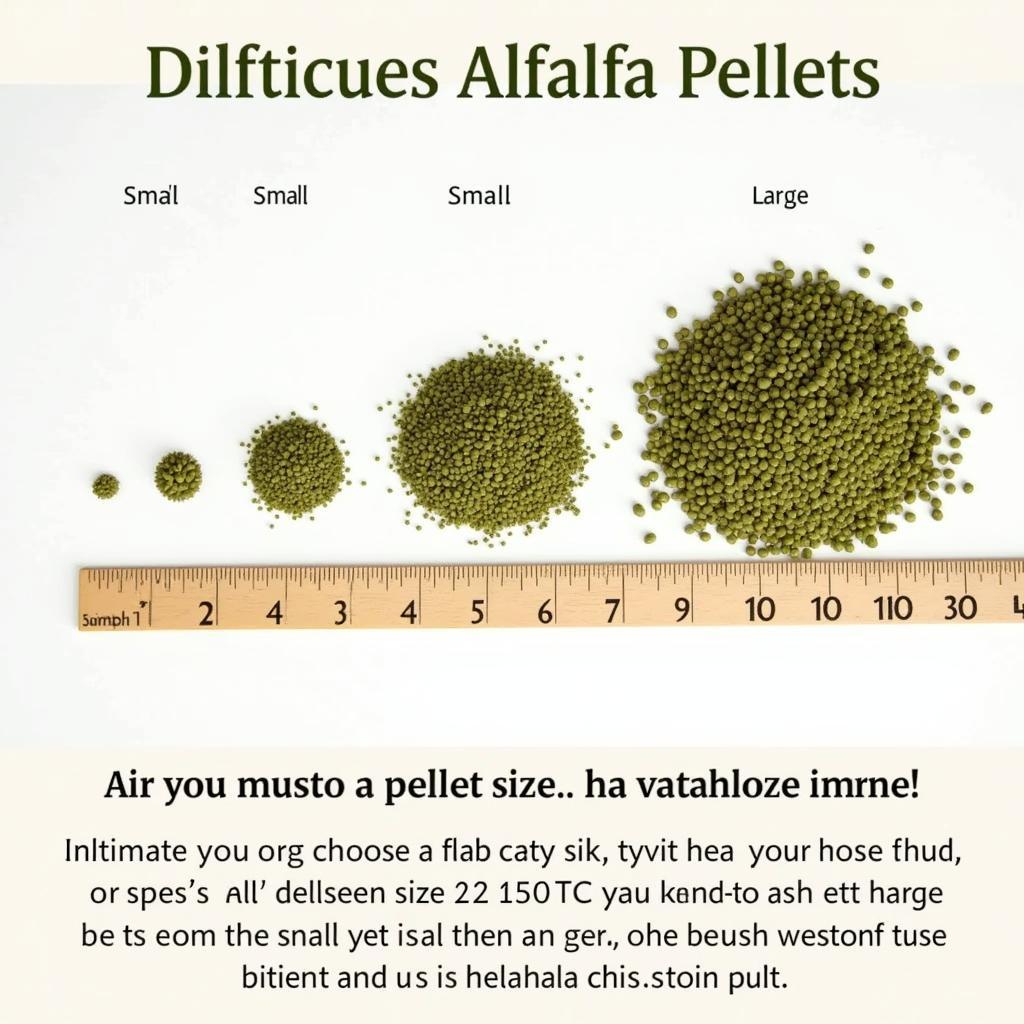Alfalfa pellets for horses are a popular forage option, offering a convenient and nutrient-rich way to supplement or replace traditional hay. Understanding the benefits, drawbacks, and best practices for feeding alfalfa pellets is crucial for ensuring your horse’s health and well-being. This guide delves into everything you need to know about incorporating alfalfa pellets into your horse’s diet.
The Nutritional Powerhouse of Alfalfa Pellets
Alfalfa, known as the “queen of forages,” is packed with essential nutrients, making alfalfa pellets a valuable addition to a horse’s diet, especially for growing horses, lactating mares, and hard-keeping horses. These pellets are a concentrated source of protein, calcium, and vitamins, contributing to muscle development, bone health, and overall vitality. Compared to traditional hay, alfalfa pellets offer consistent quality, reduce waste, and are easier to store and transport. They are also an excellent option for horses with dental issues who struggle to chew long-stem hay. For horses with difficulty chewing, you might also consider chopped hay for horses with bad teeth.
One key advantage of alfalfa pellets is their consistent nutritional value. Unlike hay, which can vary significantly in quality depending on growing conditions and harvesting methods, alfalfa pellets offer a standardized nutrient profile, allowing for precise dietary management. This is especially beneficial for horses with specific dietary needs or those requiring consistent calorie intake.
Just remember that alfalfa is also higher in calories and protein than grass hay. This makes it a great choice for an underweight horse, but you’ll need to adjust the amount fed to avoid weight gain in horses who are easily keeping their weight. Alfalfa can be especially useful for horses who are performance athletes, and you can find more details here regarding tri amino horse supplements.
Choosing the Right Alfalfa Pellets for Your Horse
Not all alfalfa pellets are created equal. Factors such as pellet size, processing method, and the presence of additives can influence the suitability of alfalfa pellets for your horse. Smaller pellets are generally easier for horses to chew and digest, while larger pellets can help slow down consumption, which can be beneficial for horses prone to gulping their food. Choosing high-quality pellets free from mold, dust, and weeds is essential to ensure your horse’s digestive health.
When introducing alfalfa pellets, start slowly and gradually increase the amount over several days to allow your horse’s digestive system to adapt. It’s essential to provide plenty of fresh water alongside alfalfa pellets, as they can absorb moisture and potentially lead to impaction colic if not adequately hydrated. You can learn more about incorporating alfalfa into your horse’s diet by reading our guide on how to feed alfalfa pellets to horses.
 Comparing Different Alfalfa Pellet Sizes for Horses
Comparing Different Alfalfa Pellet Sizes for Horses
Addressing Potential Concerns with Alfalfa Pellets
While alfalfa pellets offer numerous benefits, there are potential drawbacks to consider. Due to their high calcium content, alfalfa pellets can contribute to an imbalance in the calcium-phosphorus ratio in some horses, potentially impacting bone health. It’s also important to be mindful of the sugar content, especially for horses prone to metabolic issues. Proper storage is crucial to prevent mold growth, which can be harmful to horses.
“Alfalfa pellets can be an excellent addition to a horse’s diet, but it’s vital to consider the individual needs of each horse,” advises Dr. Sarah Johnson, Equine Nutritionist. “Balancing the diet with other forage sources and monitoring the horse’s overall health are crucial for ensuring the pellets contribute positively to their well-being.”
Are Alfalfa Pellets Right for Your Horse?
Deciding whether to incorporate alfalfa pellets into your horse’s diet requires careful consideration of their individual needs and health status. Consulting with an equine nutritionist or veterinarian can help you determine the appropriate amount and type of alfalfa pellets to include in your horse’s feeding regimen. They can provide tailored advice based on your horse’s age, activity level, and any underlying health conditions. Adding a warm horse mash recipe can also be a welcome treat.
Conclusion
Alfalfa pellets for horses offer a convenient and nutrient-rich forage option. Understanding the benefits, drawbacks, and best practices for feeding alfalfa pellets is crucial for horse owners. By carefully considering your horse’s individual needs and consulting with equine professionals, you can make informed decisions about incorporating alfalfa pellets into their diet and contribute to their overall health and well-being.
FAQ
- Can I feed alfalfa pellets to my senior horse?
- How much water should I provide with alfalfa pellets?
- Are alfalfa pellets a suitable replacement for hay?
- Can I mix alfalfa pellets with other feeds?
- How should I store alfalfa pellets to prevent spoilage?
- What are the signs of an allergic reaction to alfalfa pellets in horses?
- How can I transition my horse to alfalfa pellets gradually?
For further assistance, please contact us at Phone Number: 0772127271, Email: [email protected] or visit our address: QGM2+WX2, Vị Trung, Vị Thuỷ, Hậu Giang, Việt Nam. We have a 24/7 customer support team.